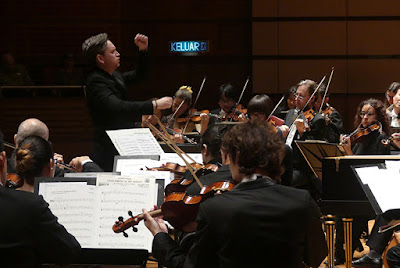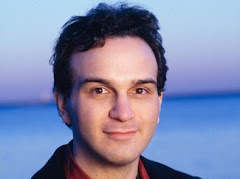A much-awaited concert was the DFP debut of Jonathan Bloxham with the MPO in August 2017. 30-year old Bloxham is the assistant conductor of the City of Birmingham Symphony Orchestra (CBSO), which is an orchestra renowned for picking outstanding conducting talent at tender ages and maturing them into famed household names like Sir Simon Rattle (later of the Berlin Philharmonic Orchestra), Sakari Oramo (later of the BBC Symphony Orchestra) and Andris Nelsons (later of the Boston Symphony and Leipzig Gewandhaus Orchestras).
An initial impression of the concert was that the content of the programme remained too much in the minor keys. The opening piece, Estonian composer Arvo Pärt's Cantus in Memoriam Benjamin Britten, which I first heard in London in 1982 at a London Philharmonic Orchestra concert under Rudolf Barshai, brought back memories of how poignant Pärt's composition was.
Bloxham and the strings of the MPO brought a hypnotic stillness to the Cantus, with a slowly building intensity throughout interspersed with a three-note motif on a tubular bell, as the single Aeolian melodic motif diverged throughout the string lines and spiralled downwards with a gravitational inevitability to the final A minor chord. The MPO gave it a somewhat warmer, lusher timbre than that with which this spare, pure piece is often performed.
Bloxham then directed the MPO from the cello, playing Vivaldi's Cello Concerto in C minor RV401. This was a very engaging performance of the cello concerto, played in an exceptionally vivacious manner, reminiscent of the way the Venice Baroque Orchestra and Andrea Marcon perform Vivaldi with normal concert tuning (A=440Hz) but with great character and vivacity as well as wide dynamic contrasts.
Due to the vivacious speeds set in the outer movements, there were a few garbled notes produced by Bloxham and the top A-string notes on the very warm-toned 1710 Giuseppe filius Andrea Guarneri cello (on loan from Florian Leonhard Fine Violins, London) sounded a mite weaker than its lower strings.
Next up, Bloxham and the MPO served us with an exceptionally warm interpretation of Webern's Langsamer Satz of highly Romantic intertwining threads and superb string playing from the MPO.
We were treated to yet another Vivaldi Concerto next, his Concerto in D minor for 2 violins and cello RV565 (Op 3 No 11). Peter Danis and Timothy Peters, the leaders of the 1st and 2nd violin sections of the MPO strings took on the solo parts, whilst Bloxham played the cello. This was yet another vivacious performance of the Vivaldi, with a beautifully sustained and lyrical Siciliano second movement led by Peter Danis.
After the interval, we saw Bloxham's talent in leading the MPO to a soaring interpretation of Brahms' grand Symphony No 1. His approach was classically sculptured and precise, with steady traditional pacing right through the whole symphony. Bloxham captured the weightiness of the opening movement at a comfortable tempo until a melancholy oboe solo played exquisitely by Simon Emes broke the initial turbulent atmosphere. The first movement (played sans the exposition repeat) was cogently argued and well balanced, without the raging timpani overpowering the orchestra.
The second movement flowed smoothly and provided a mesmerisingly peaceful reprieve from the turbulent first movement. The trio of solo violin (Peter Danis), horn (Grzegorz Curyla) and oboe (Simon Emes) was particularly beautiful with lyrical melodies that seemed to soar out of their instruments. The third movement then followed with Bloxham imparting an appropriately genial character to it.
The fourth movement is the trickiest for any conductor to master. Bloxham managed all the difficult tempi changes superbly, especially the pizzicato accelerando section twice and the transitioning of the Piu Andante section to the hymn portion marked, Allegro non troppo, ma con brio.
Everything here felt just right: from the brief trombone chorale (later triumphantly revisited), to the hymn that famously echoes the Ode to Joy theme, through to the vigorous coda that was full of excitement and spark. Bloxham made no big pullback for the brass chorale and the final pages made for a very grand and thrilling close.
With Bloxham's brilliantly conducted MPO debut, it would be great to see him back in KL in the near future in more Romantic and Baroque fare like Schoenberg's Verklärte Nacht (Transfigured Night) Op 4 in an orchestral guise and Vivaldi's Concerto in A minor for 2 violins RV522 (Op 3 No 8) respectively.
Tuesday, 26 September 2017
Bloxham's brilliant MPO debut
Labels:
Brahms,
CBSO,
Jonathan Bloxham,
MPO,
Pärt,
Peter Danis,
Timothy Peters,
Vivaldi,
Webern
Subscribe to:
Post Comments (Atom)


















































No comments:
Post a Comment